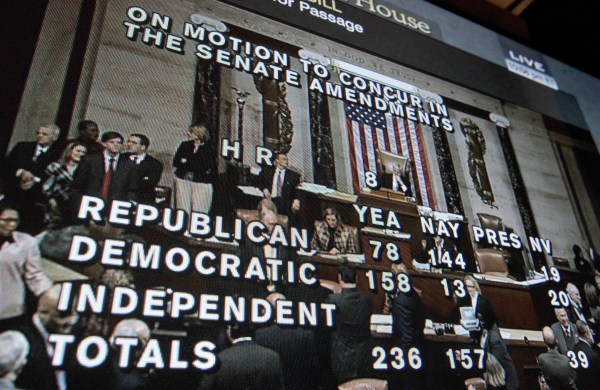Happy Friday! The Annals of Improbable Research magazine hosted the 34th annual Ig Nobel Prize ceremony at MIT yesterday. The awards—not to be confused with the illustrious Nobel Prize—recognize odd scientific achievements. One winner explored the feasibility of pigeon-guided missiles, and another evaluated the swimming abilities of dead trout.
Quick Hits: Today’s Top Stories
- An Israel Defense Forces (IDF) official said Thursday the IDF killed nine Hamas terrorists in an airstrike near the central Gazan neighborhood of Nuseirat, targeting a Hamas command and control center that was previously used as a school. Three of the slain fighters were also employees of the United Nations Relief and Works Agency for Palestinian Refugees (UNRWA), according to the IDF. The Hamas-operated Gaza Civil Defense authority reported 18 people in total were killed in the strike, while the U.N. said six of its employees died in the aerial attack. “Upon receiving reports claiming that local Palestinian UNRWA workers were killed as a result of the strike, the IDF requested that the agency provide details and names of the workers, in order to thoroughly review the claim,” IDF spokesperson Lt. Col. Nadav Shoshani tweeted on Thursday. “To date, no answers have been provided by UNRWA despite repeated requests.”
- Israeli special forces reportedly attacked an underground missile factory in Syria—constructed by Iran but operated by the Iranian-backed, Lebanese-based terrorist group, Hezbollah—in a raid on Sunday near its border with Lebanon, according to unnamed U.S. officials. The Israeli government has declined to comment on the attack. The attack, the details of which emerged on Wednesday and Thursday, reportedly included airstrikes and an operation in which Israeli commandos rappelled from helicopters to retrieve sensitive information from the site. It also destroyed short- and medium-range precision missiles assembled at the facility. Syrian-state media reported that the raid killed at least 16 people and injured dozens more.
- Ukrainian President Volodymyr Zelensky said on Thursday that Russia was responsible for an airstrike that killed three International Committee of the Red Cross (ICRC) employees and injured two others in eastern Ukraine’s Donetsk Oblast. The ICRC confirmed the deaths but did not assign responsibility for the strike, saying the employees’ vehicles were attacked as they prepared to transport wood and charcoal to civilians in Viroliubivka, a Ukrainian village near the front line. “I condemn attacks on Red Cross personnel in the strongest terms,” ICRC President Mirjana Spoljaric said in a statement. “It’s unconscionable that shelling would hit an aid distribution site.”
- The Biden administration issued new sanctions on Thursday against 16 individuals linked to Venezuelan President Nicolás Maduro—including leaders of the country’s election commission and supreme court—accusing them of obstructing the country’s “transparent electoral process and the release of accurate election results.” The U.S. has previously recognized Maduro’s political opponent—Edmundo González, who fled to Spain last week—as the rightful winner of Venezuela’s presidential election in July.
- The United States Secret Service announced Wednesday that Secretary of Homeland Security Alejandro Mayorkas designated January 6, 2025—the date Congress will convene to certify the results of the 2024 presidential election—as a National Special Security Event. The agency said it would work with federal, state, and local law enforcement officials to design and implement “a comprehensive and integrated security plan.” This is the first time the procedural certification has received the designation, which is traditionally reserved for high-profile occasions such as presidential inaugurations, the U.N. General Assembly, and the Super Bowl.
- A North Dakota state district court judge on Thursday struck down a state abortion ban signed into law in April 2023 that prohibited abortions in most cases, allowing exceptions in cases of rape and incest up to six weeks of gestation, and exceptions for medical emergencies at any point in the pregnancy. The court ruled that the law violated North Dakota’s state constitution and that its text was too vague. “The Court concludes the law is impermissibly vague on its face, and as currently written it threatens to inhibit the exercise of constitutionally protected rights for both North Dakota physicians and North Dakota patients,” Judge Bruce Romanick wrote in his 24-page opinion. Attorney General Drew H. Wrigley promised to appeal the decision.
- New York City Police Commissioner Edward Caban resigned on Thursday, only one week after the FBI searched his home and seized his phone in connection with a criminal investigation. “The [New York Police Department] deserves someone who can solely focus on protecting and serving New York City, which is why—for the good of this city and this department—I have made the difficult decision to resign as police commissioner,” Caban wrote in a department-wide memo on Thursday. The resignation also comes after several senior members of Mayor Eric Adams’ administration have had their homes searched and/or phones seized. Adams had his own phones and iPad seized by the FBI in November 2023 as part of an apparent FBI investigation into his 2021 mayoral campaign and potential ties to the Turkish government. The mayor and his campaign also received a new round of subpoenas last month.
- Former Democratic Sen. James Sasser of Tennessee, who also served as the U.S. ambassador to China under President Bill Clinton, passed away on Tuesday at the age of 87, according to his family. After spending nearly six years in the U.S. Marine Corps Reserve, Sasser was elected to the U.S. Senate in 1977, where he went on to serve three terms before losing to former Republican Sen. Bill Frist in 1996.
‘We’re Going to Continue to Work on This’

We hope you enjoyed the summer break from our recurring “will they or won’t they” series regarding one of the legislative branch’s most basic constitutional duties: funding the government. Our goal was to ease back into appropriations season last month, but there’s a chance we’re now headed straight into shutdown watch.
House Speaker Mike Johnson pulled a six-month stopgap funding measure—a continuing resolution (CR)—from the floor on Wednesday after it became clear he lacked the Republican votes to pass it. As Congress nears a September 30 deadline to fund the government, the speaker’s strategy for getting fiscal year 2025 appropriations across the finish line is increasingly unclear. Both Democratic and Republican leadership want to avoid a protracted funding battle or shutdown ahead of the election, but whether Johnson will be able to secure enough GOP support is yet to be seen.
“We’re going to continue to work on this,” Johnson said after pulling the CR, adding that the Republican conference would try to build a consensus behind the resolution. “We’re gonna work through the weekend on that.” As we explained last month, Johnson’s proposed CR largely met the requirements of the House Freedom Caucus (HFC), a group of Republican hardliners with a contingent of members who almost always refuse to vote for temporary funding measures. The proposal included the Safeguard American Voter Eligibility (SAVE) Act—a House bill requiring Americans to provide proof of citizenship to register to vote in federal elections that was drafted by Rep. Chip Roy of Texas, the HFC policy chair.
But enough of the hardliners remained true to form this week, refusing to support the CR package even with the SAVE Act included. And given Johnson’s narrow, four-vote majority—which temporarily shrunk even further this week after Republican Rep. Joe Wilson of South Carolina was admitted to the hospital after suffering stroke-like symptoms—any defection can be a death blow. “I’ve never voted for a CR, and I’m not about to start now,” Republican Rep. Greg Steube of Florida declared on Wednesday. HFC member Rep. Tim Burchett of Tennessee argued that the proposal was a pointless exercise: “They’re expecting folks to vote for bad spending so they can add [the SAVE Act] on, and then Chuck Schumer will strip it and send it back.”
Notwithstanding the fact that the HFC itself endorsed the exercise, Burchett isn’t wrong about the SAVE Act: It’s dead on arrival in the Democratic-controlled Senate. In a divided government, there’s no political path for GOP hardliners’ demands to become law, making compromise a necessity to avoid a government shutdown. House Republicans would, in theory, have some negotiating leverage if they actually passed the Johnson proposal, effectively tossing the funding hot potato to the Democrats.
But neither Democratic nor Republican leadership appears to have an appetite for a game of shutdown chicken this close to the election and risk potential negative blowback hurting their members who are up for reelection.
“We’ve seen how this ends,” Democratic Caucus Chairman Pete Aguilar said on Tuesday. “The only way to pass a government funding bill is to pass it on a bipartisan basis.”
Hardliners like Burchett and Roy have long argued that the appropriations process is broken and enables runaway deficit spending. If the HFC had its way, House and Senate committees would work through each of the 12 annual appropriations bills required to fund the various parts of the government. The bills would be haggled over individually and some compromise versions would be passed in both chambers before the fiscal year ends on September 30.
But the last time the government was funded that way was in 1996. Appropriations haven’t been completed on time in the 21st century and only three times in the last 48 years—only five of fiscal year 2025’s bills have passed the House and none have passed the Senate. Instead, Capitol Hill relies on extensions in the form of CRs to keep the lights on while the parties sort out longer term spending measures. When legislation is eventually passed, it’s almost always in the form of a package or packages that combine some or all of the 12 bills into an omnibus—even the 1996 appropriations process included a six-bill “minibus” passed the day before the government would have run out of money.
The HFC’s statement last month framed their endorsement of a six-month CR as a way to avoid an end-of-year omnibus package to complete appropriations. “Government funding should be extended into early 2025 to avoid lame a lame duck omnibus that preserves Democrat spending and policies well into the next administration,” the group said. But at least as of Thursday, enough of their members don’t want to actually vote for a CR. “You don’t have a Republican majority that ever really wants to vote for an appropriations bill that can get through a divided government,” Matt Glassman, a senior fellow at Georgetown University’s Government Affairs Institute, told TMD.
House Minority Leader Hakeem Jeffries and Senate Majority Leader Chuck Schumer both want a shorter-term CR that would expire before the end of the year and allow Congress to complete appropriations before the end of the year—a move that would protect a potential Harris administration from a messy funding battle right off the bat. The same logic would presumably apply to a potential second Trump administration. But a six-month CR could also potentially benefit Johnson by pushing spending decisions that could inflame GOP hardliners beyond January when he’d be running to either remain speaker or become the minority leader, depending on who controls the House after the election.
But for now, the hardliners seem unsatisfied with Johnson’s efforts. Former President Donald Trump also threw a wrench into the debate Tuesday when he posted on Truth Social, “If Republicans in the House, and Senate, don’t get absolute assurances on Election Security, THEY SHOULD, IN NO WAY, SHAPE, OR FORM, GO FORWARD WITH A CONTINUING RESOLUTION ON THE BUDGET.”
On the opposite wing of the party, moderate Republicans argue that Johnson’s SAVE Act gambit is only dragging out the CR process and taking time away from campaigning. “Right now, it seems our time would be much more well spent back in the district,” said Rep. Anthony D’Esposito, a Republican up for reelection in a battleground New York district.
Republican conference grumbling aside, Glassman argued that the desire to avoid a shutdown should ultimately be strong enough to get a CR done. “I suspect late next week or early the week of the 23rd, they’ll just get a clean CR moving, and that’ll be that,” he told TMD. If the House remains a sticking point too long, Senate Republicans are prepared to step in and move a bipartisan CR in their chamber. “We must avoid a government shutdown at all costs,” GOP Sen. Susan Collins told Semafor yesterday. But she added that for now, “it seems to me that we should wait and see what the House decides to do.”
Worth Your Time
- The federal government pays the bills for the U.S. military, but that doesn’t mean the Department of Defense shouldn’t seek out bargains. “The Department of Defense’s entrenched procurement model is characterized by high costs, low volumes, and sole-source contracts. Given the demands of modern warfare, it represents a critical vulnerability in the U.S. defense apparatus,” Michael Hochberg, Leonard Hochberg, and Isaiah Wilson III wrote in Law & Liberty. “The DOD has ended up in a self-defeating trap wherein it spends heavily on R&D in a way that works well for generating technical overmatch, differentiation, and exquisite capability, but fails utterly for the low-cost production of commodity parts at scale,” they wrote. “Today, we behave like autocrats in our DOD purchasing, implementing many of the worst aspects of a top-down, centrally planned, limited-sourced, monopolistic acquisitions system. … We should be leveraging the power of capitalism and free markets to drive down costs and increase capacity. That means more than just signing new contracts with the same old DOD primes. It means a fundamentally different attitude toward building military systems and consumables.”
- Haitian immigrants are not eating the cats and dogs of Springfield, Ohio, but how concerned should we be about the recent rise in Haitian immigration to the U.S? “Haiti itself is a desperately poor and horrifically violent country,” Noah Smith wrote in his Noahpinion Substack. “And yet when we look at how Haitians actually do in the U.S., that story seems to fall apart. For example, although Haitian immigrants tend to be less educated than Americans, their children tend to be more educated than the general population. … Haitians’ incarceration rates are also low. For Haitians who immigrated legally—like the ones in Springfield, Ohio—the rate of incarceration is even lower than the average for all legal immigrants.” However, even these compelling points miss an important element. “Merit should be decided based on individual characteristics, not what ethnic group someone belongs to. If I’m Haitian, I should never have to point to aggregate statistics … just to prove that a Haitian can become a good American.”
Presented Without Comment
BBC: Biden Wears Trump Hat As 9/11 Unity Gesture, Says White House
Also Presented Without Comment
The CEO of Rio Tinto—the world’s second-largest mining conglomerate—opening the company’s Q2 2024 earnings call with a land acknowledgment:
I acknowledge the Gadigal people of the Eora Nation on whose traditional lands we are gathered today. And I pay my respects to elders, past and present.
I extend that respect to all indigenous people across the globe. I acknowledge the important role that continues to play within communities and our business.
Also Also Presented Without Comment
Reuters: Indigenous Group Takes Fight Against Rio Tinto Arizona Copper Mine To U.S. Supreme Court
The dispute centers on the federally owned Oak Flat Campground, known as Chi’chil Biłdagoteel in the Apache language and where many Apache worship their deities. The site sits atop a reserve of more than 40 billion pounds (18.1 million metric tons) of copper, a crucial component of electric vehicles and nearly every electronic device. If a mine is built, it would create a crater 2 miles (3 km) wide and 1,000 feet (304 m) deep that would destroy that worship site.
In the Zeitgeist
Supreme Court Justice Ketanji Brown Jackson was featured in the New York Times’ “By the Book” series on Thursday, describing herself as a “voracious reader” who enjoyed the Wrinkle in Time series growing up. She said she “really identified with Meg,” putting herself in the good company of our favorite fictional footballer:
Toeing the Company Line
- Alex and Peter waded through an avalanche of half-truths and outright lies to fact-check this week’s presidential debate.
- In the newsletters: The Dispatch Politics team reported on congressional Republicans’ reactions to Trump’s “make IVF free” proposal, Will explained how veto authority has run amok in San Francisco, and Nick highlighted (🔒) just how radical Trump’s inner circle has become.
- On the podcasts: Sarah, Steve, and Jonah dive into Tuesday’s debate on the Dispatch Podcast and analyze whether it will move the electoral needle.
- On the site: Reilly Stephens pens an explainer on federalism, and Kevin highlights the irony of Donald Trump the patriot harboring disdain for most of America.
Let Us Know
What are your thoughts on the SAVE Act? Is trying to include it in the CR worth another protracted government funding battle?








Please note that we at The Dispatch hold ourselves, our work, and our commenters to a higher standard than other places on the internet. We welcome comments that foster genuine debate or discussion—including comments critical of us or our work—but responses that include ad hominem attacks on fellow Dispatch members or are intended to stoke fear and anger may be moderated.
With your membership, you only have the ability to comment on The Morning Dispatch articles. Consider upgrading to join the conversation everywhere.